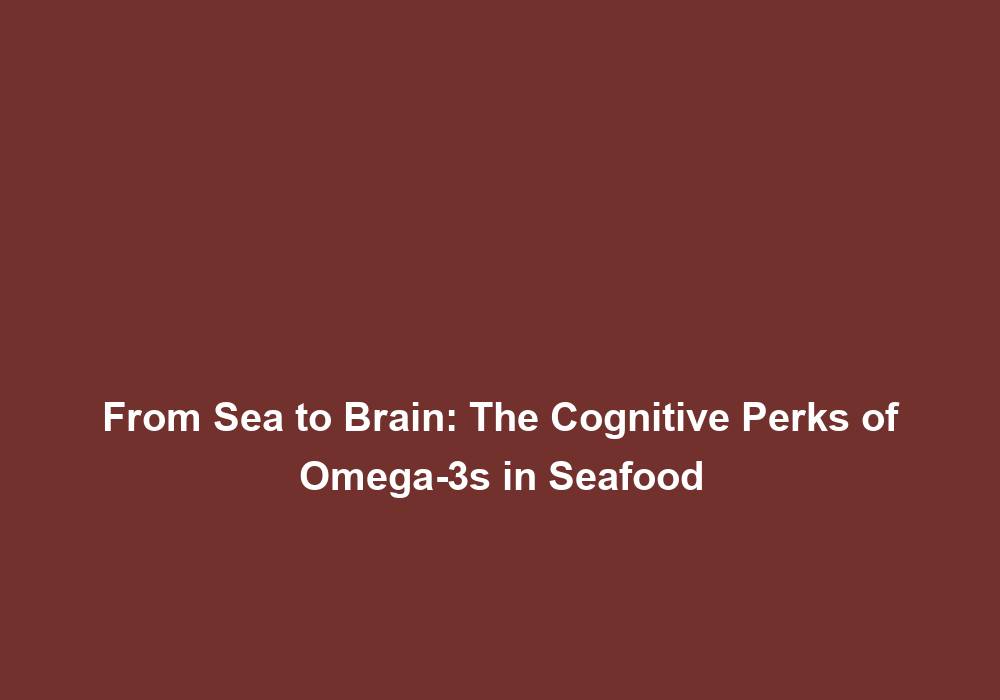From Sea to Brain: The Cognitive Perks of Omega-3s in Seafood
The human brain is an extraordinary organ that relies on essential nutrients to function optimally. One nutrient that has garnered significant attention for its cognitive benefits is Omega-3 fatty acids. These fatty acids are abundantly found in seafood, making it an essential component of a brain-healthy diet. In this article, we will explore the cognitive perks of Omega-3s in seafood and delve into the scientific evidence that supports their positive impact on the brain.
What are Omega-3 Fatty Acids?
Omega-3 fatty acids are a type of polyunsaturated fat that plays a crucial role in various bodily functions, including brain health. They can be categorized into three main types: alpha-linolenic acid (ALA), eicosapentaenoic acid (EPA), and docosahexaenoic acid (DHA).
While ALA is primarily found in plant-based sources such as flaxseed and walnuts, EPA and DHA are predominantly derived from seafood. These two forms of Omega-3s are particularly important for brain health and have been extensively studied for their cognitive benefits.
The Role of Omega-3s in Brain Health
-
Improved Cognitive Function: Numerous studies have consistently shown that Omega-3 fatty acids, especially DHA, play a significant role in enhancing cognitive function. DHA is a major structural component of the brain, accounting for approximately 25% of its total fat content. It is involved in neuronal cell signaling, membrane fluidity, and synaptic plasticity, all of which are crucial for optimal cognitive performance. By supporting these fundamental processes, Omega-3s contribute to improved memory, attention, and overall cognitive abilities.
-
Reduced Risk of Cognitive Decline: As we age, cognitive decline becomes a concern, with an increased risk of neurodegenerative diseases such as Alzheimer’s and dementia. However, research suggests that regular consumption of Omega-3s may help mitigate this risk. Omega-3s have been found to preserve brain volume, slow down age-related cognitive decline, and improve memory and learning abilities. Moreover, their anti-inflammatory and antioxidant properties may protect against neurodegeneration and promote healthy brain aging.
-
Enhanced Mood and Mental Health: Omega-3 fatty acids also play a crucial role in maintaining mental well-being. Studies have consistently shown that individuals with higher levels of Omega-3s in their blood have a lower risk of developing depression and anxiety disorders. These fatty acids are believed to regulate neurotransmitters, including serotonin and dopamine, which are essential for mood regulation. Additionally, Omega-3s possess anti-inflammatory properties that help reduce neuroinflammation, a contributing factor to mental health disorders.
The Link Between Seafood and Omega-3s
Seafood, particularly fatty fish such as salmon, mackerel, sardines, and trout, stands out as an excellent source of Omega-3 fatty acids. These fish accumulate high levels of EPA and DHA through their diet in the ocean. By regularly consuming seafood, individuals can reap the cognitive perks associated with these essential fatty acids.
To ensure the highest Omega-3 content, it is recommended to choose cold-water fatty fish that are sustainably sourced. Cold-water fish tend to have higher levels of EPA and DHA due to their natural adaptation to cold environments. The American Heart Association suggests consuming at least two servings (3.5 ounces per serving) of fatty fish per week to meet the dietary requirements of Omega-3s.
Other Sources of Omega-3s
While seafood is the most abundant source of Omega-3s, individuals following a vegetarian or vegan diet can still obtain these essential fatty acids from plant-based sources. Here are some examples:
-
Flaxseed and Chia Seeds: These tiny seeds are rich in ALA, which is a precursor to EPA and DHA. Ground flaxseeds or chia seeds can be easily incorporated into smoothies, baked goods, or sprinkled on salads to give a plant-based Omega-3 boost.
-
Walnuts: Walnuts are not only a delicious snack but also a good source of ALA. Adding a handful of walnuts to your daily diet can contribute to your Omega-3 intake and provide additional health benefits, such as improved heart health.
-
Algal Oil Supplements: Algal oil is derived from algae and serves as an excellent vegetarian source of DHA and EPA. It is available in supplement form and can be a suitable alternative for those who do not consume seafood. Algal oil supplements offer a convenient way to ensure an adequate intake of Omega-3s for individuals following a plant-based lifestyle.
Conclusion
In conclusion, Omega-3 fatty acids found in seafood play a vital role in brain health and cognition. Regular consumption of Omega-3s, particularly DHA and EPA, has been associated with improved cognitive function, reduced risk of cognitive decline, and enhanced mood and mental health. Seafood, especially fatty fish, is an excellent dietary source of these beneficial fatty acids. However, for those following a vegetarian or vegan lifestyle, plant-based sources such as flaxseed, chia seeds, walnuts, and algal oil supplements can provide an alternative means of obtaining Omega-3s. Prioritizing Omega-3 intake is a step towards nurturing a healthy brain and maintaining cognitive well-being throughout life.
Disclaimer: The information in this article is intended for informational purposes only and should not be considered as medical advice. Please consult a healthcare professional or dietitian before making any significant changes to your diet or lifestyle.







